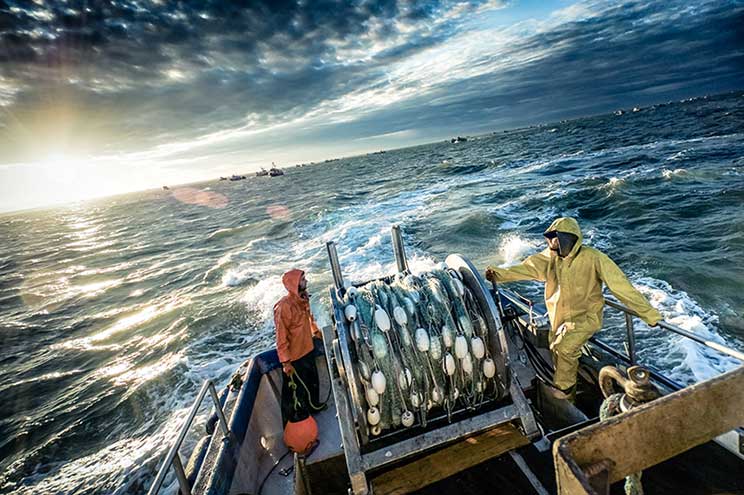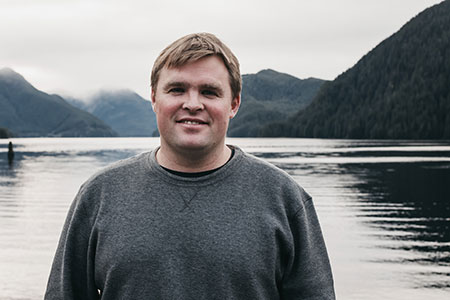By Louis Martin, RCAC staff writer

In Bristol Bay, Alaska, local fishermen battle uncertainty even in the best of times. The Bristol Bay community is considered a watershed: a region that channels rainfall and snowmelt to creeks, streams, rivers and eventually to outflow points such as Bristol Bay itself. Climate change, inconsistent harvests, and heavy competition from out-of-state fishermen are daunting challenges local fishermen face each summer. But in the new COVID-19 world, Bristol Bay’s terrible past relationship with pandemics adds a new threat.
“During the Spanish Flu of 1918, Bristol Bay, Alaska, was the hardest hit area in the entire United States. Entire villages were wiped out. So, going into the summer, there was a massive amount of concern from the Indigenous communities in Bristol Bay,” says Benjamin Blakey co-owner and president of Northline Seafood.

With RCAC’s Loan Fund support, Blakey is hoping to provide one solution to what he says is an economy that’s gradually siphoned wages away from Alaska to “the lower 48.” He sums up the problem in a single sentence, “Fishermen are being paid based on how much they catch, instead of the quality of their catch.” In Bristol Bay, commercial-caught salmon are harvested from a group of more than 1,300 independent fishing vessels. Salmon processing companies like Northline must support a fleet of fishermen, and in exchange this fleet commits to sell salmon to Northline. Blakey explains that most salmon processing business models in Bristol Bay are designed to serve and reward those fishermen that catch the most fish—the “highliners.” Highliners represent only 20 percent of the total fleet. However, they may catch up to 60 percent of the total harvest. These fishing vessels are often larger, more expensive boats owned by out-of-state fishermen. To purchase and maintain these vessels requires access to capital and credit that does not exist for many Bristol Bay watershed residents and Alaska Native fishermen.
Traditionally, Bristol Bay fishermen deliver their catch to a contracted “tender”—a large vessel that uses cranes to unload fish from multiple fishing boats. This tender will then carry a consolidated load of fish (from up to 100 fishing vessels) to large, land-based processing facilities. There, salmon will be prepared for a long journey from Bristol Bay to a grocery store thousands of miles away. The process is expensive and time-consuming—it may take up to three days for a salmon to transfer from the fishing grounds to the processing line and freezer. The results are higher costs and lower quality salmon.
Rather than trying to compete in this model, Northline is rebuilding the supply chain. Northline does not use tenders. Instead, Northline purchases fish directly from fishing vessels onboard a floating processor. The processor is located directly on the fishing grounds. Northline then freezes the salmon it purchases within 24 hours of being caught, eliminating multiple days of transport, fuel and lost quality. Northline uses a proprietary flash-freezing technique—a tunnel blast freezer that operates at -70 degrees Fahrenheit. This freezer system can freeze a whole salmon to an internal core temperature of -20 degrees Fahrenheit in less than three hours. From there, Northline resells the frozen fish as they were caught to markets in North America, South East Asia and China. In 2020 with the COVID-19 pandemic in full swing, Northline directed its early sales and distribution efforts to serve Alaska Native communities around southwestern and northern Alaska.
At Northline, a minimal custody chain means that buyers can trace their salmon back to the individual vessel that caught it.
It’s a paradigm that rewards quality and puts the local economy at the center. At Northline, a minimal custody chain means that buyers can trace their salmon back to the individual vessel that caught it. It also cuts out the substantial fish transport and processing expenses and leads to higher gross profits. The value of these efficiencies is split equitably across the supply chain. Northline pays its fishing fleet more per pound of fish. In 2020, the average base price of sockeye salmon in Bristol Bay was $0.70 cents per pound—Northline paid its fleet $1.00, or 40 percent more than the base payment offered by its competitors. More than 90 percent of Northline’s fishing fleet is from Alaska, and most fishermen live locally within Bristol Bay. Northline’s fishermen may not catch as much as other fishing fleets, but its fishermen deliver higher quality fish, which can maximize their own profits. Finally, Northline employs 35 part-time and eight full-time residents—paying them more and employing them longer than traditional processing facilities.
Northline’s whole fish freezing may be a solution to the growing climate change effects on salmon returns. While Bristol Bay yielded a productive salmon return, Blakey says that climate change is felt in the form of inconsistent salmon returns across Alaska. Alaska Native communities across the state depend on wild salmon resources for subsistence and food security throughout the winter. Last summer, Alaska Native communities, like the Chignik, halted all subsistence salmon harvests hoping that the salmon population would replenish. Blakey points out that some Native communities have a diet almost completely reliant on wild harvested protein.
“If no fish return in the summer, they lose a significant, traditional source of food.” Blakey says.
In Chignik’s case, Blakey worked with donors and nonprofit organizations, such as Alaskans Own, to provide 45,000 pounds of salmon to the Tribe at a minimal cost to them. Blakey says he developed relationships with various Tribal leaders in the region not just from a lifetime of fishing but also from his advocacy work. Since 2008, alongside Tribal Nations, he’s been active in the fight against the Pebble Mine development in Bristol Bay. The proposed Pebble Mine would be the largest copper, gold and molybdenum mine in the Americas. Its development would result in the largest open pit mine in the Western Hemisphere, which opponents say would contaminate the local waters and decimate the salmon industry. In late November 2020, the Army Corps of Engineers[1] denied a key permit to the Pebble Mine project, likely defeating the proposed development or at least delaying it for some time.
In an August 2020 interview with The Cordova Times[2], George Anderson, president of the Chignik Intertribal Coalition, acknowledged the tough salmon season and how important Northline’s intervention was. Anderson explained that letting the salmon escape the river system was the responsible choice for long-term sustainability. But the potentially disastrous tradeoff for the Chignik Tribe didn’t happen thanks to Northline and Alaskans Own. Northline’s barge also serves as an all-in-one support vessel for the fleet. While vessels deposit their hauls, they can also restock on supplies and fuel, allowing them to return to open waters faster and more frequently. For smaller vessels with less capacity, this is a major competitive advantage.
Blakey says the fishing barge is the operation’s cornerstone, and it wouldn’t have been possible without RCAC’s support. Loan Fund officers Robert Longman and Michael Carnes worked with Blakey and his business partner, Gene Glabb, to secure a $4.8 million loan to procure and outfit Northline’s barge.
Blakey’s vessel experienced zero cases of COVID during the fishing season and committed to a zero-contact policy to ensure Native populations would not be exposed.
With fishing season approaching, the industry was plunged into the same health crisis as the rest of the world. But as Blakey said, the stakes felt higher for a fishing company with a community focus. In Bristol Bay, there is a narrow window of a few precious months to generate profit. Social distancing and quarantine delays don’t appeal to companies who have already spent a fortune to prepare and depend on big returns to recoup losses. But for Northline, there was never a question of cutting corners or sidestepping safety.
Strict measures were put into place, and the fact that Northline did not employ a large workforce became a serious asset. Blakey’s vessel experienced zero cases of COVID during the fishing season and committed to a zero-contact policy to ensure Native populations would not be exposed. This meant workers would quarantine outside of Bristol Bay, show a negative COVID test, and then be flown to a remote beach in Bristol Bay to be picked up by a small Northline vessel. Blakey is proud of the company’s safety record; Northline was one of just three facilities out of 14 to experience zero outbreaks. Luckily, the outbreaks that did occur were all confined to facilities, with no known community spread. But Blakey acknowledges that it did not come without a financial cost, estimating that the extra measures cost Northline anywhere from $150,000 to $200,000.
Blakey says that RCAC again stepped up to help, deferring Northline’s principal interest payments for four months. “RCAC’s the most significant bank in Northline’s existence. We wouldn’t be here without them,” Blakey says. The savings went straight into safety measures for the Northline employees.
Although anxiety was high about what the fishing season would look like, Northline’s 2020 summer season was a success. The business model is proven and Northline’s customers, both fishermen and marketplaces, have opened the demand for high quality frozen fish wide open.
Despite COVID-19 and the immediate threats it poses, Blakey says that climate change is still the long-term threat to the salmon industry. Variable harvests will continue, meaning that food shortages will be exacerbated in the future, and he believes the solution to uncertainty is flexibility.
“You have to be extremely adaptable. You have to be quick, and you have to be efficient. And do all that without losing your core values,” Blakey says. “That’s not easy. It’s something we have to work hard at every day here at Northline. We’re constantly pushing to do the right thing.”
[1] Nov. 25, 2020, NPR – https://www.npr.org/2020/11/25/939010891/army-corps-of-engineers-denies-permit-to-controversial-alaska-gold-mine
[2] Aug. 18, 2020, The Cordova Times – https://www.thecordovatimes.com/2020/08/18/alaskans-own-northline-seafoods-share-the-harvest/
